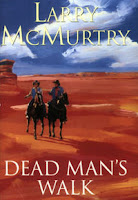
Here, is the eagerly awaited prequel to Larry McMurtry's Pulitzer Prize winning novel, Lonesome Dove. In Streets of Laredo he bought the story ahead, giving us Woodrow Call in his old age; in Dead Man's Walk, he takes the reader back, to the days when Woodrow Call and his friend Gus McCrae - surely two of the most beloved figures in American fiction - were young Rangers, first confronting the wild frontier that will form their lives. Danger, hardship, sacrifice, pain and fear test them to the limits of endurance; friendship, comradeship, courage and love give them the strength to survive and be cheerful against fearful odds.I first read Lonesome Dove years ago, not long after the mini series came out in fact, so that makes it..what..nearly 20 years ago. Since that time, I either didn't hear that Larry McMurtry had gone on to write further books in the series or just didn't take any notice. With my participation in the Pulitzer Project where the goal is to read all of the Pulitzer Prize winners, I figure now is as good a time as any to reread Lonesome Dove (hereafter referred to as LD) which one the award in 1986, but if I was going to do that, then I wanted to be sure to have started at the beginning of the story, and so I found myself reading this book.
In Dead Man's Walk Woodrow and Gus are not yet twenty; young Rangers in the days when Texas was still an independent republic. Having volunteered to join the forces of the capricious land pirate Caleb Cobb in a foolhardy attempt to seize Santa Fe from the Mexicans, they experience their first great adventure, in the barren, empty landscape in which shocking violence appears out of nowhere, whether from nature or Indians. Though their eyes, we meet the great Comanche war chief Buffalo Hump (one of McMurtry's most compelling creations), his companion Kicking Wolf, who specialises in prolonged torture, the deadly Apache child-stealer Gomez. It is these formidable figures - cruel, swift and almost invisible - who confront and eventually defeat Caleb Cobb's expedition, plus most of the Mexican army. Woodrow and Gus's companions include Matilda Roberts, a whore known as The Great Western, and Bigfoot Wallace, the famous scout. The wildness of the Frontier and the men who live there - the Indians defending it with savagery, the Texans attempting to seize and 'civilize' it, the Mexicans threatened by both - are at the heart of Larry McMurtry's extraordinary novel, at once a profound work of literature and one of the most riveting adventure stories of all time.
Part of my difficulty in writing this review, is that I am comparing the writing and atmosphere in this book to a book I read so many years ago and remember absolutely loving, but not remembering much else in terms of specifics. It could therefore be that some of the issues that I had in reading this book were already present in LD and I just didn't remember them.
The narrative in Dead Man's Walk takes us back, way back, to where Gus McCrae and Woodrow Call are very young men - twenty years of age - and they are just setting out on their first adventures as Texas Rangers. Gus is impulsive, smooth talking and restless, Woodrow more of a thinker and less hotheaded but when he loses his temper he really loses it. Also travelling with them are a number of other colourful characters including the whore Matilda Roberts (known as the Great Western) who alternates between a prostitute and a mother figure during the novel (but is portrayed to have such bravery and put up with an awful lot), various trackers and Indian hunters.
After a disastrous first trip where the Rangers find themselves hunted by the vicious Indian chief Buffalo Hump, the boys join up for another adventure - this time a raid against Santa Fe which at that time was held by the Mexicans. This time they have not only Buffalo Hump and his cohorts to deal with, but also Gomez (an Apache warrior) and Mother Nature, all the while being lead by a man who only had marginally more experience than themselves.
In many ways the events in this book try and include as many of the things that we have come to expect from Westerns - there are Indian raids, scalpings, there are crazy Ranger leaders, there are whores (oh my...are there whores - Gus in particular is constantly obsessed with them), there are Mexicans, wild animals, wild weather. In fact, you name it. Anything that could go wrong on a journey across the wilds of colonial America does and McMurtry doesn't skimp on any of the gruesome details. He also has no heart for the minor characters he has created as he kills them off with reckless abandon - each method of death more and more gruesome.
Then there is an ending which whilst is has the desired effect of getting our two heroes out of the predicament that they found themselves in, seems a somewhat strange resolution to that problem.
For me, whilst this was an interesting read, it wasn't the compelling, touching tale that I remember LD to be. There are definitely glimpses within the characters of Gus and Call where you can see the men that were loved by so many in LD, and the colours and drama of the Wild West definitely came to life, but maybe in a slightly too surreal fashion.
I am looking forward to reading the next book in this series, which I believe is Comanche Moon.

Great review, Marg! I absolutely love this series...I have read it twice now. I wouldn't say I'm a big western fiction reader, but McMurtry is so gifted. By the way, I love your blog look!
ReplyDeleteThanks for stopping by Wendy.
ReplyDelete